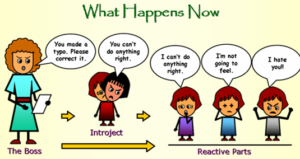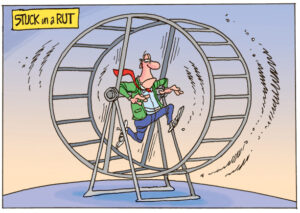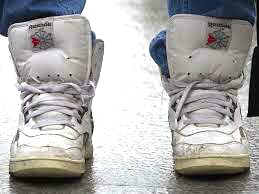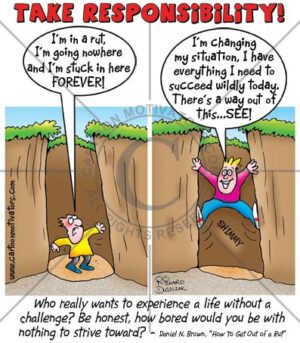Podcast: Play in new window | Download
Depression is a stuck state. A limbo.
Stuck in all-or-nothing.
Whether it is low grade or higher, it is still depression.
It is not a bad mood, although laughing becomes less joyful and less frequent.
Flailing, like I said in another article is frequent… trying to grab onto some stuff that isn’t going down like everything else.
I have been depressed now for a few weeks now. It became unmistakable yesterday.
Whether this is happening so I can be authentic when I teach it, or just the way the cookie crumbles, I don’t know. And I don’t care either.
 Now I have a case study for you, or maybe two, or maybe three.
Now I have a case study for you, or maybe two, or maybe three.
Depression is easier to deal with when it is clearly the case. When hurry, feverish activity that doesn’t produce result can be identified as flailing.
Is depression an illness?
I, of course, don’t have the official definition of illness, so I muscletested. Muscletest (Source) says ‘no, it isn’t an illness.’
Let me poke around a little in Source: Is schizophrenia an illness? yes. Hm. Is bipolar an illness? no. Is anxiety an illness? No.
OK, now I am really confused of what emotional/mental condition is an illness… so I’ll just leave it alone.
So I am going to call depression a REACTION. Hm. Reaction to what?
A reaction to what is. A reaction to reality. In comparison. In comparison, in contrast of how it SHOULD BE.
The inner world and the outer world.
If and when the inner picture and the outer picture don’t mesh, because there are should’s and is’s and other delusions in the way.
What is a delusion?
A delusion says something that is not true, but to the person it looks true.
Reality simple. Or at least not complicated. There are things that can be measured and the measures don’t lie. Only the human lies.
I have written a lot about these lies. My friend who said ‘but I am good!’ Or me, years ago: ‘but I know!’ while the ‘measures’ in reality say the opposite.
Or say that what you say about yourself doesn’t effect the measures.
If you cannot do something, or cannot do it well, or don’t do it even if it saved your skin… that is a measure in reality.
There is a notion making the rounds that you can effect reality by words. It is part of some religion-like movements. If you get caught in them, you lie habitually hoping that your words change reality.
That your hope matters. That what you want to be true becomes true because you say it is true.
 Some people are users. Some are even abusers. And some are takers.
Some people are users. Some are even abusers. And some are takers.
Very few if any are honest, hardworking, expecting the results they produce with their actions.
But it is not socially advantageous to tell the truth about that. Neither that you have what you worked for, nor that you are using people, abuse people, or take what belongs to them.
So we can safely say that humanity is a lying species. They use words, or the semblance of actions to cover up their real agenda.
And when there is a gap between who you are and who you want others to think you are, there is depression.
And that means that every person on the planet is in a state of depression all the time. Only the degrees differ.
Unless, of course, you are a psychopath. Then you just don’t care.
I just finished a book about a family of women who were all murderers and prostitutes. They had it as ‘the family tradition’. Obviously psychopaths. Let me ask Source: is psychopathy an illness? No. So there you have it. It isn’t an illness, and yet.
So back to depression.
My theory is that the stuck state of depression is due to lying. Pretense is also a lie. Making airs is also a lie.
And lying is what causes the depression. Lying traps you stronger than any walls, any physical thing.
 And we call the issue integrity. Having a match between the tongue in your mouth and the tongue in your shoes. A match between what you present and who you are when no one is looking. A match between what you demand of others and what you are willing to demand of yourself.
And we call the issue integrity. Having a match between the tongue in your mouth and the tongue in your shoes. A match between what you present and who you are when no one is looking. A match between what you demand of others and what you are willing to demand of yourself.
I am also reading Benjamin Franklin’s autobiography. I am taken by his describing his struggle to attain virtues, and his MOVES to cover up that he is unsuccessful.
One of the virtues he works on is humility. But he is not at all humble, he is quite prideful. So he devised ways he can appear humble, moves that give the appearance of humility, and make him more agreeable than he would be, if his pridefulness peeked through.
I am quoting from the book, Benjamin Franklin’s Autobiography:
——
I cannot boast of much success in acquiring the reality of this virtue (humility), but I had a good deal with regard to the appearance of it.
I made it a rule to forbear all direct contradiction to the sentiments of others, and all positive assertion of my own. I even forbade myself, agreeably to the old laws of our Junto, the use of every word or expression in the language that imported a fixed opinion, such as ‘certainly,’ ‘undoubtedly,’ etc., and I adopted, instead of them, ‘I conceive,’ ‘I apprehend,’ or ‘I imagine’ a thing to be so or so; or ‘it so appears to me at present.’
When another asserted something that I thought an error, I denied myself the pleasure of contradicting him abruptly, and of showing immediately some absurdity in his proposition;
and in answering I began by observing that in certain cases or circumstances his opinion would be right, but in the present case there ‘appeared’ or ‘seemed’ to me some difference, etc.
I soon found the advantage of this change in my manner:
the conversations I engaged in went on more pleasantly; the modest way in which I proposed my opinions procured them a readier reception and less contradiction; I had less mortification when I was found to be in the wrong; and I more easily prevailed with others to give up their mistakes and join with me when I happened to be in the right.
And this mode, which I at first put on with some violence to natural inclination, became at length so easy and so habitual to me, that perhaps for these fifty years past no one has ever heard a dogmatical expression escape me. And to this habit (after my character of integrity) I think it principally owing that I had early so much weight with my fellow-citizens when I proposed new institutions, or alterations in the old, and so much influence in public councils when I became a member; for I was but a bad speaker, never eloquent, subject to much hesitation in my choice of words, hardly correct in language, and yet I generally carried my points.
In reality there is, perhaps, no one of our natural passions so hard to subdue as pride. Disguise it, struggle with it, beat it down, stifle it, mortify it as much as one pleases, it is still alive, and will every now and then peep out and show itself. You will see it, perhaps, often in this history; for, even if I could conceive that I had completely overcome it, I should probably be proud of my humility.
Franklin’s Autobiography (Eclectic English Classics) (pp. 39-40). Kindle Edition.
—–
The most counter-intuitive thing for a human, given the human nature of lying and pretending, is humility.
Franklin says:
no qualities were so likely to make a poor man’s fortune as those of probity and integrity.
Probity means: the quality of having strong moral principles; honesty and decency.
But in certain families, in certain cultures children grow up learning to pretend. Learning that the way you make it in life is through pretending well.
I have a client who has been feeding me b.s.
Every time we had a workshop to look at the first incident, she brought up an incident that wasn’t her first.
The first incident is when you decide who you are going to be, and she had already decided that pretending was the way.
When we go back the first incident, we can see what she saw and what made her decide that pretending was the way.
Another client who is a liar (more than most) had a first incident when she was three years old. Her father bought a ton of tootsie rolls to give to the trick or treaters that night. She wanted a tootsie roll, but her father said: those are for the trick-or-treaters.
She saw her father’s real nature then, that appearances were more important than reality, that appearing generous to the kids of rich people in the neighborhood was more advantageous than giving a tootsie roll to his child. It is not an accident that she followed in her father’s moral footsteps.
So although my other client managed to fool me for a whole year, now, looking again, I can see the first incident that she never shared: her parents, one or both, were more interested in appearances than in being honest and decent. So she decided that it works and that is how she was going to be, come hell or high water.
Having your moral compass negated at such an early age leads to a live of no integrity.
But, of course, the moral compass, conscience is getting more and more out of line.
Moreover, it is harder and harder to produce work that produces results, so on the long run a life of pretense ultimate leads to ruin. Publicly or privately, but ruin nevertheless.
Due to the work we have been doing, the second client managed to actually COMMIT to industry, which is an old word for doing work that produces results. We call it being a producer. And is now on the other side of this stuck in pretense state.
But she will get stuck again, unless she is aware that that is her worldview she decided on in the tootsie roll incident.
The other client is still beating herself up, doesn’t understand, fights it… hasn’t been able to see it for what it is: a child’s binding decision about life.
So what happens when your whole worldview and how the world really is conflict? What happens when you can’t make way in the world because your worldview holds you back?
You experience depression.
Am I saying that when you act, when you maybe even feel depressed, you should stop and look how your worldview keeps you split?
Yes.
Sometimes, like in my case, the issue didn’t come up until I was assigned a coach in the program I am taking. A coach who probably decided that the way to handle life is to lie about it. Use a positive approach. Soothe it over.
So she is the perfect coach to kill my life… because I thrive on telling the truth. But her words split me.
How? In her view I am better than I am. I am a wonderful, glorious winner. I am using my own words, because I forgot how she said it.
She sees me as a big promise for HER success as a coach.
It had happened to me before, by the way. And every time someone had that attitude about me, I made sure I disappointed them.
Because a ‘positive picture’ is like a straitjacket… and I experienced myself in jail with it. So I rebelled.
So to summarize: depression is a sign of a split. A split between reality and ‘how it is supposed to be’. Positivity, high view of self, high expectations, and what is real: life is hard and you get done what you get done.
It is my bad luck to have gotten a coach who unintentionally entrapped me in a split way of being.
But for the purposes of being able to DISTINGUISH something that probably no one else has distinguished before: it is a blessing.
So what could help you to climb out of depression, and maybe even stay out of it?
I say practicing integrity.
Like Benjamin Franklin, you may want to start with looking at your standards and ideals.
Moral standards… and start practicing them.
And if you are as far gone as my client whose first incident I had to construct, because she would not share: what would help her lift herself out of the trap? Of being so split?
I don’t know.
If and when I find a way, I’ll report here…
And what am I going to do about MY depression? I just did the most important thing: I identified the split.
And bring the capacity of allowing to it. Allow the coach to say whatever the coach says, and spend time cleansing myself of it every time she says anything. So I can be with what is, with how I am, with what I can do and can’t do…
And do the work. If I succeed, I’ll succeed. If I fail, I’ll look to see what I did, what I saw through delusion, and dust myself off and do it again. Making sure I won’t make the same mistake again.
PS: is depression a topic I should dedicate my life to hereon?
On one hand, depression and managing it, getting out of it, is an evergreen topic for humans.
On the other hand very few people consider that quiet desperation they find themselves day in and day out as depression.
Do I want to work with people who consider themselves depressed, i.e. sick? Not at all.
Is there another way I could approach the issue? Hell yes. Integrity.
People KNOW that their integrity is missing. And if they also learned that the way to have a great life, love themselves, love life is through restoring integrity, then maybe they would be willing to learn the how of integrity.
So let’s test this out, shall we?
I am going to schedule a ‘pilot’ program on integrity. Just enough to be dangerous. When? I don’t know. Some time in the next 3-4-5-6 weeks.
In the meantime you can peruse my previous courses on integrity.
PPS: Another glitch
in the worldview of those who are most stuck in this trap is not seeing that everything is a process. That inch by inch everything is a cinch… Instead they go for big flashy moves, putting the cart in front of the horse.
He who would move a mountain starts with moving a few stones.
He who would create a business will test the idea, the methodology or the product out working for someone else. Not by buying a domain name, creating labels, and act if it is a home-run for certain.
When I wanted to be a publisher, I first worked for a little magazine where it was easy to do every job publishing entailed. Selling advertising. Writing articles, Designing ads. Taking pictures. Laying out the publication. And last but not least the distribution.
It was a physical magazine, but every ‘job’ inside has a parallel in the digital world. For example: distribution: getting visitors to a site. Marketing. Got it?
As long as you think of the world a big flashy moves, you are going to remain in your depression trap.
PPPS: I have found quite a number of videos and websites that deal with the issue of lying, the issuing of being stuck.
Over time I’ll create a library of them… some are really good.

